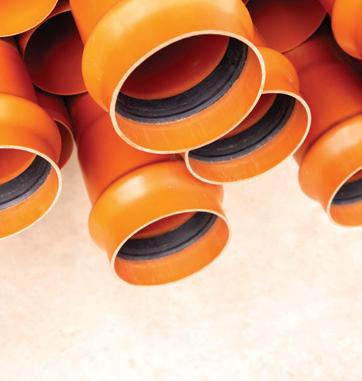
2 minute read
NI self-builds refused wastewater connections
Less than two out of three self-builders get their applications for sewage connections approved by NI Water because of a lack of infrastructure, as the utility rolls out a new application portal.
Capacity constraints in the mains water and sewer networks are holding back development in NI, Gerry Curran of Northern Ireland Water (NIW) told delegates at the Belfast Building for Tomorrow conference in March. Curran also highlighted NIW’s new Self Service Portal allowing self-builders to apply online for a new water or wastewater connection.
Much of the supply constraints have to do with a “legacy of prolonged, chronic underinvestment in our wastewater infrastructure”, Curran said. “Development has continued and used up any surplus capacity.” Some water capacity issues also exist, with more developing, especially within Belfast, he added.
Wastewater capacity constraints affect 80 per cent of properties in NI, Curran said, especially in cities and towns. Many wastewater treatment plants also work above their designed capacity, leading to discharges to watercourses and flooding.
There is a capital works programme underway, although Curran said the “NI Executive must secure the funding necessary to deliver the investment in water and wastewater required for NI”.
From July 2021 to December 2022, Curran said that 58 per cent of applications for a wastewater mains connection related to single units. During the six month period
Rural areas hit by supply constraints
All provinces have seen significant depletions in the volume of houses available for sale since the start of 2020.
Supply decreased 37 per cent in Connacht, 36 per cent in both Ulster and Munster and 12 per cent in Leinster, according to Marian Finnegan, Managing Director of estate agents Sherry FitzGerald.
Finnegan highlighted that rural Ireland has been most significantly impacted by falling supply. Roscommon and Kerry showed the largest decreases then Tipperary and Carlow.
“At this juncture we need to be targeting over 52,000 new homes each year, double our current output levels,” she said.
House prices to increase
2,331 (61 per cent) of single unit applications were approved unconditionally, 1,240 were approved with response specific conditions (32 per cent) and there were 280 outright refusals (7 per cent).
An onsite wastewater treatment system (OWWTS) is the alternative to a sewage connection. To install an OWWTS selfbuilders have to apply for a consent to discharge to the Department of Agriculture, Environment and Rural Affairs.
Applications for consent to discharge are done online and most get approval as long as the treatment system is compliant and reaches high levels of water treatment.

The Q4 2022 MyHome report by Davy predicts house prices to increase 4 per cent in 2023 in ROI.
The report notes that first time buyers, under the First Home scheme and local authority schemes, could push up house prices further by fuelling demand.
The Society of Chartered Surveyors, meanwhile, asked its members to forecast by how much national residential values would rise and the answer was just 2 per cent in 2023 with 1 per cent of that expected in the first quarter.










